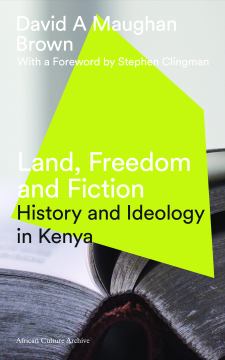
Additional Information
Book Details
Abstract
This now classic work examines the contrasting ways in which the Mau Mau struggle for land and independence in Kenya was mirrored, and usually distorted, by successive generations of English and white Kenyan authors, as well as by indigenous Kenyan novelists. Against the turbulent background of the Mau Mau Uprising, Dr Maughan-Brown explores the relationship between history, literary creation and the myths that societies cultivate. Spanning the breadth of colonial and post-colonial African literature, his subjects range from the colonialist authors Robert Ruark and Elspeth Huxley to the post-independence novels of Meja Mwangi and Ngugi wa Thiong'o.
Maughan-Brown's book is invaluable on many levels. He presents a concise account of the uprising and its place in Kenyan identity, and significantly increases our understanding of settler attitudes and the role of literature within colonial ideology. Land, Freedom and Fiction succeeds in showing the subtle insights a materialist approach can bring to the study of literature, ideology and society.
Professor David Maughan-Brown is the former Deputy Vice Chancellor of York St John University. Brought up in East Africa and educated in South Africa, he previously lectured in the Department of English at the University of Natal
‘A book extraordinarily attuned to the impress of history, politics and ideology upon literature… This, in other words, is a major study, the kind that lasts.’
Stephen Clingman, from the Foreword
Table of Contents
| Section Title | Page | Action | Price |
|---|---|---|---|
| Cover | Cover | ||
| About the Author | iii | ||
| Title Page | v | ||
| Copyright | vi | ||
| Contents | ix | ||
| Foreword by Stephen Clingman | xi | ||
| Preface and Acknowledgements | xv | ||
| 1. Introduction | 1 | ||
| Ideology | 4 | ||
| Literary Theory | 11 | ||
| 2. 'Mau Mau' as a Historical Phenomenon | 20 | ||
| Problems of Definition | 20 | ||
| 'Causes' of the Revolt | 23 | ||
| Origins and Organisation of the 'Mau Mau' and History of the Oath | 30 | ||
| Conduct of the Campaign: 'Mau Mau Atrocities' and State and Settler Repression | 36 | ||
| Social Composition of the 'Mau Mau' Movement | 41 | ||
| Towards a Categorical Definition of the Movement | 46 | ||
| Ideologies of the History of 'Mau Mau' | 49 | ||
| The Colonial Interpretation and 'Mau Mau' Oathing Ceremonies | 49 | ||
| Post-Independence Accounts: 'Mau Mau' Autobiographies and 'Progressive' and 'Reactionary' Nationalist Interpretations | 56 | ||
| 3. Kenyan Colonial Settler Ideology | 66 | ||
| The Colonial Economy as a Determinant of Settler Ideology | 66 | ||
| Colonial Settler Ideology in its Aspect as Metropolitan Export | 74 | ||
| Colonial Settler Race Ideology: Myths and Stereotypes | 77 | ||
| Kenyan Colonial Settler Ideology as a Variant of Fascist Ideology | 93 | ||
| Terminology of Colonial Accounts of 'Mau Mau' | 97 | ||
| 4. Nothing of Value: Colonial Fiction about 'Mau Mau' | 106 | ||
| Fiction as Propaganda and the Settler Novelists | 106 | ||
| The Embodiment in Fiction of Colonial Myths About 'Mau Mau' | 114 | ||
| Fictional Devices Used in Propounding Colonial Settler Ideology | 127 | ||
| The Fiction's Rendering Visible of the Ideological Structures of Colonial Fascism | 136 | ||
| 5. 'Plus fa Change ...': Liberal Fiction from the Metropolis | 157 | ||
| The Effect of Settler Propaganda on the Metropolitan Image of 'Mau Mau' | 157 | ||
| The 'Liberal' Fiction | 163 | ||
| 6. Economy, Politics and Ideology in Post-Independence Kenya | 183 | ||
| From Colonial to Neo-Colonial Economy | 184 | ||
| Key Components of the Dominant Ideology: 'Unity', the Kenyatta Myth, and the Rejection of 'Mau Mau' | 190 | ||
| 7. Novels of the 'Freedom' | 206 | ||
| Post-Independence Fiction as Praise-Song to the 'Leader' | 208 | ||
| Further Resemblances to the Colonial Fiction: The Aesthetics of 'Balance' and the Politics of Contempt | 218 | ||
| 8. Not Yet the Freedom | 230 | ||
| The Changing Image of 'Mau Mau' in Ngugi's Novels | 230 | ||
| A Grain of Wheat as the Exemplary 'Crisis Text' | 247 | ||
| Conclusion | 258 | ||
| Bibliography | 266 | ||
| Index | 275 |
